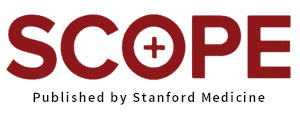From across Stanford Medicine, members of the LGBTQ community gathered last week to share their concerns and to strengthen their presence on campus.
The standing room-only crowd of about 100 people included Dean Lloyd Minor, MD, and other school leaders, medical and graduate students and everyone in between.
"Just as we at Stanford Medicine strive to lead in research, patient care and education, we have the opportunity to lead in meeting the needs and affirming the value and importance of our LGBTQ community," Minor said, greeting attendees. "It’s a personal passion and commitment for me, as well as a leadership responsibility."
Several recent surveys point out the need for a more cohesive LGBTQ coalition, said event organizer Tim Keyes, a third-year MD/PhD student. For example, a demographic survey (soon-to-be released) conducted by the Office of Faculty Development and Diversity last October found that about 14 percent of the School of Medicine is comprised of people who identify as sexual or gender minorities. Yet 58 percent of respondents in that group said they felt a weak or no sense of a sexual and gender minority community at the school, Keyes explained.
A different survey that looked at mental health among Stanford medical students in the 2016-2017 academic year found that 93 percent of students identifying as sexual or gender minorities had experienced anxiety or depression in their lifetimes, well above 75 percent for anxiety and 63 percent for depression for straight or gender normative students, Keyes said.
Respondents of the School of Medicine-wide survey offered several possible suggestions for the future, including the creation of an annual event -- which Keyes said would be a good task for the town hall attendees to handle.
Using an instant crowd polling platform, Keyes queried the audience about their desires for the event. The result, crafted in just a few minutes, was that most people would prefer an outdoor event in the early fall that featured a speaker or speakers and food. A few attendees, realizing the possibilities of a tool that instantly fed entries onto the room's large screen, also urged for the inclusion of a drag show at the fall event, eliciting widespread laughter.
Keyes then opened up the discussion to the audience, and attendees shared their experiences and asked questions.
One common theme was a shared desire for more faculty members who are sexual and gender minorities, particularly those of color. Minor urged attendees to notify department leaders if they know of potential candidates.
Many attendees also commented that the fact this town hall was held at all was a hopeful, and helpful, step.
"We'd like to make sure this is a place where everyone feels at home," Neil Gesundheit, MD, interim senior associate dean for medical education.
The event concluded with a fun giveaway -- attendees picked up new, limited edition Stanford Medicine gay pride pins, shown in the photo above, which were designed by medical student and graphic designer Ryan Brewster.
Image courtesy of Ryan Brewster





